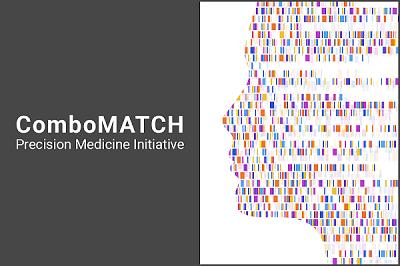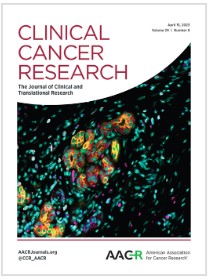ComboMATCH Overview
ComboMATCH is a large precision medicine initiative with a coordinated set of clinical trials evaluating new anti-cancer drug combinations in select groups of adults and children with cancer. The drug combinations show evidence that they may be more effective than single therapy in treating some cancers.
Precision medicine refers to the tailoring of treatment based on each individual's characteristics. In ComboMATCH, treatment focuses on specific molecular abnormalities in cancer tumors known to drive cancer growth.
Participants
ComboMATCH is for patients with solid tumors that have spread to nearby tissue or lymph nodes (locally advanced) or have spread to other places in the body (advanced or metastatic) and have progressed on at least one line of standard systemic therapy. ComboMATCH is also for patients with a type of advanced cancer for which no standard treatment exists that has been shown to prolong overall survival.
Highlights
ComboMATCH consists of multiple treatment trials, each one to evaluate the effectiveness of a specific drug combination in a select group of patients (called a phase 2 trial design).
In this initiative:
- Participants will be assigned to treatment based on laboratory tests that look at the unique genetic material (genes) of tumor cells. Patients with gene abnormalities included in ComboMATCH may benefit from the therapies being studied.
- The drug combinations are either two targeted therapies together or a targeted drug with chemotherapy
- Each treatment trial has its own research goals, patient eligibility criteria, and enrollment timeline
- Multiple researchers are leading each treatment trial, offering opportunities for both junior and senior investigators to work alongside translational researchers
ComboMATCH will grow over time as additional treatment trials become available. In total, there will be about 2900 people taking part in this study.
A Unique Endeavor
ComboMATCH will provide promising treatment options for patients while serving as a vehicle for translating robust pre-clinical evidence of the therapeutic effectiveness of new drug combinations into the clinic.
This initiative is important because of growing evidence that drug combinations may be more effective than single drugs. Most tumors do not have a single genetic driver of cancer growth. Therefore, most patients do not benefit from single-agent therapies that target only one gene abnormality. Even when patients benefit from genetically-matched single drugs, the medicines often stop working—called drug resistance. Will genetically-matched drug combinations be more effective than single drugs? ComboMATCH aims to find out.
Questions?
- Patients interested in learning more about ComboMATCH should start by speaking with their doctor or healthcare team
- Reach out to the Contact Center at the National Cancer Institute, where trained specialists answer cancer-related questions in English and Spanish
- Study personnel with questions may send an email to the ComboMATCH Help Desk


